- Home
- G. K. Chesterton
The Complete Father Brown Mysteries Collection Page 47
The Complete Father Brown Mysteries Collection Read online
Page 47
I replied that in such a case the friends in question might be expected to shelter their comrades.
"And," said I, "it is idle to look for your men here. Surely you know of the relations between Sir Borrow and his son?"
He was much interested in this, and questioned me closely--a proceeding I did not resent under the circumstances. A few days later I was stopped in the park by an American lady and her daughter, who pretended to be much interested in the old place, and asked me if it were not possible to get permission to visit it. In these I recognised also the agents of the police, and I put them off with what excuses I could; not that it would have mattered at such a time, for Southby had not then returned. He was to come three days afterwards, at dead of night, and the two who were to know of his coming would have stood at nothing for his sake. They were his sister Evelyn and Wellman, the butler, who had loved Southby as his own son.
It was from Wellman himself that I had the news at nine o'clock on the following morning. He came carrying a pretended letter from Sir Borrow, and not until we were alone in my study, and the door shut behind us, did he dare to speak freely.
"Mr. Southby's home, sir," he said in a whisper. "He's in the priest's room."
I feared to speak for a moment. Instantly I had visions of the hunted lad, fleeing from thicket to thicket of the forest he knew so well, and finally gaining that deep glen wherein is the subterranean entrance to the Close. That he had thought of it when none of us remembered! Of course, the police would know nothing of that. The very servants, save Wellman alone, are in ignorance of the existence of the passage, and locally it is believed that it perished long ago. Sir Borrow let them think so.
It was one of his humours to have the place opened up by the engineers who came from London to sink his artesian well. He liked to go to and fro as he pleased, to catch his servants when they least expected him. And so he used the priest's room for the purpose, or did use it until the tragedy happened. Nothing afterwards interested him. The secret chamber remained unopened after Southby was convicted. The rest of us, I think, had almost forgotten its existence.
The chamber lies at the western end of the long gallery. There is an octagon tower there, with an ancient stone staircase cunningly built within its walls. To this you gain access from the gallery by opening a panel upon the right-hand side of the smaller chimney. The room lies at the foot of one flight of stairs, and is lighted from two narrow windows giving upon the battlements. These are filled by stained glass of the fourteenth century, and show former abbots of Borrow in alb and chasuble. The room itself is large and commodious, and has a fireplace and an alcove for the bed. Those who desire to go from it to the forest descend the staircase until they find themselves in the old crypt which dates from Saxon times. The subterranean passage leads from that to Adam's Thicket, where it enters an ancient well, long dried up, and now but a pit of grass and bramble. I did not doubt that Southby had gained the forest by a devious route and had made his way by one of those paths which no stranger would discover. And so he had gone straight to the priest's chamber, and thence to Evelyn's bedroom.
"He waked her about one this morning," said Wellman, who still appeared to be trembling with the excitement of the news. "They wouldn't let you know sooner, sir, for fear of the police. Miss Evelyn is dreadfully afraid that the squire will find out, and so I came to you at once. Lucky for us, it was only yesterday afternoon that Superintendent Matthews searched the Close from garret to cellar. He must have had wind that Mr. Southby was on the road."
I was astonished to hear this.
"Superintendent Matthews--yesterday!" I exclaimed. "Is it really possible, and Miss Evelyn told me nothing of it? But, of course, it may have been difficult to send. Does he know anything of the priest's hole, Wellman? Surely you don't fear that?"
He shook his head, being a man of uncommon caution.
"They know a great deal too much nowadays, sir--more's the pity. The question is, what are we to do with the young master, since Miss Evelyn is at her wits' end? She would be pleased to see you at the Close, indeed and she would. It's a hard task for a young lady, as you can well imagine, sir."
I agreed, and, putting on my hat, went over with him immediately. Our way lay through Adam's Thicket, and I confess that I suffered some alarm when a stranger appeared upon our path not a hundred paces from the ancient basin by which the passage is reached. He was a short, thick-set man, wearing a serge suit with black leather leggings and a peaked cap, and when he saw us he stopped abruptly for a moment, then turned his back upon us and pretended to light a cigarette while we passed.
"He is no policeman," I said to Wellman, when the stranger was out of hearing. The old servant agreed with me.
"But he might be an inquiry agent, sir. I've heard tell in London of the tricks they play with their clothes. Don't trust him too far."
"I am not going to trust him at all," said I. "The fellow looked to me as though he were a chauffeur."
"A bad lot, believe me, sir. There's been few honest men upon wheels since they robbed us of our horses. A man wants the nose of a setter to keep track of such as him. I wouldn't trust one of them with a silver-plated soup-ladle, upon my word I wouldn't."
I told him he was a laudator temporis acti, but as that conveyed nothing to him we pushed on, and found Evelyn in the boudoir.
She was dreadfully agitated, but Sir Borrow being there, no word of the affair might pass between us. The baronet plainly thought that his daughter had become hysterical, and when I was alone with him he hinted that she must have had some news from that d--d scoundrel.
"Whatever it is," he added, "I don't want to hear of it or of him. It would be a great day for me if the fellow were six feet underground, and I hope to God he soon will be. That's the truth, Cope, and none of your philosophy can change it. I have no longer a son; I am trying to forget that I ever had one."
I shrank from his anger, knowing well how little such a man would suffer a rebuke. Happily, he set out to drive into the town almost immediately, and Evelyn and I went at once to the priest's hole and interviewed Southby. He was in a sorry plight, I must say, his face and hands torn by the brambles of the thickets, his clothes splashed with mud, his beard unshaved, and his eyes bloodshot. I thought also a little delirious from want of food and exposure, and he talked incoherently of ships and the sea, of men who had betrayed him, and of others who were his friends. By-and-by, when he became calmer, he told me that the ignominy of prison affected him to such an extent that he would have gone mad if he had remained at Parkhurst.
"I couldn't have done it, Cope, by God I couldn't," he said. "You don't know what it means to a man who has lived as I have. I had to go or it would have been all up with me. If they take me I will shoot myself. That's an oath and I'll keep it."
"But," cried I, "whatever will you do, Southby? You must know that we cannot long protect you here."
He laughed defiantly, pushing the black hair from his forehead quite in the old way.
"Lionel will do it," he said. "I trust Lionel. He got me out; he'll see I don't get in again. You must know Lionel. He's a white man all through, and the prison that can hold him has got to be made. Why, it was his idea about the motor-boat--who else would have thought of it?--he and his friend at Hendon. They picked us up in the cove at high tide, and we were landed at Hayling Island before morning. I knew we should get through when Lionel undertook it."
"Then," exclaimed I, quite at hazard, "Captain Kennington knew nothing of it?"
His brow darkened at this. He looked at Evelyn curiously, and appeared afraid to speak out.
"No, I don't trust Kennington--not much. Mind what you're doing in that quarter, Evelyn. Kennington isn't thirty cents--you remember it."
She flashed out at this, a girl of spirit and a good heart.
"Do not say a word against Captain Kennington!" she cried. "He is the only friend you ever had who remained staunch to you. You should be grateful to him."
He still
persisted, though with a weakening resolution.
"That may or may not be. It's my opinion he tried to give us away, and I shall stick to it. Now, get me a drink for heaven's sake. I am as dry as a camel."
She fetched him a brandy-and-soda, and he drank it eagerly. It was already a danger to pass to and from the long gallery, and I began to perceive the peril of the situation. Let the servants know and sooner or later the news would go to the village, and thence to the police. When we discussed it frankly between ourselves there seemed but one solution. Evelyn must be ill, and Harriet must be recalled from Bath to wait upon her. Meanwhile, Wellman must have a confidant, and none seemed better suited to the purpose than Turner, the head housemaid. Sooner or later this woman would discover us. We determined that it should be sooner, and, calling her to the conference, we put our fortunes into her hands. Good woman, she had a brother of her own, and Evelyn was beloved by them all.
We made our plans, and for the moment they were successful. Harriet, unfortunately, could not return from Bath, her aunt being taken seriously ill and really requiring her assistance. Evelyn, however, feigned an indisposition very cleverly, and although it put me to some conscientious difficulty, I suffered myself to think of the greater good of that unhappy family and to acquiesce. Nevertheless, I understood that it was but a brief respite. The perils of the situation were manifest. Any day, any hour might discover us, and we began to go as those who feared their own shadows.
Perhaps my fears may have been responsible for a delusion, but there were moments when I thought that Sir Borrow suspected us. His manner became suddenly aggressive, and he questioned me more closely than he had done for a long time. Had I heard from that "d--d" son of his? Was Evelyn worrying about "the worthless scoundrel"? To all of which I responded with what wit I could, though God knows my position was difficult. Later on I discovered him in Evelyn's bedroom, and that very night, after dinner, he spoke of Kennington. oddly enough, his opinion of that gallant soldier was exactly that of his son. He did not trust him, doubted his record, and stigmatised him most unjustly as a penniless adventurer. As to my knowledge the captain is in possession of an income of eight hundred pounds a year, I resented the slander, and did not fear to speak my mind. The result was a sharp quarrel, and the expression upon his part of a shabby apology, with which in any other circumstances I would have been far from satisfied. As it was, I had to bear with him, and to listen while he told me that, whatever happened, he would not have Kennington in the house again. Then he went off to his study, I to the priest's room to tell them of my suspicions.
Southby had always been afraid of his father. My news alarmed him, and he did not hesitate to affirm that the old man would deliver him up to the police should he be discovered at the close. Evelyn herself appeared to be of the same opinion, and when we were alone she confessed the terror of her situation.
"Captain Kennington is coming here at the week-end," she said.
I told her what sir Borrow had said, and it did but alarm her the more.
"Sometimes I wish I were dead," she declared.
And I, who knew how much that gentle soul had suffered, prayed to God that strength might be granted her.
The following night I was to meet Lionel Mester in the thicket, and to experience an apprehension more acute than any I had yet suffered in this woeful affair.
It was the Sabbath eve, and I was returning from the Close to the choir practice in our beautiful old parish church. A hundred yards from the well's head, where the secret entrance lies, I met again the short, thick-set man whom Wellman had declared to be a detective. This time he stopped, and begging me to step aside into the thicket, he introduced himself immediately.
"You'll have heard of me, sir--Lionel Mester, Mr. Southby's pal."
"Yes," I said, "I have heard of you. Why do you come to this dangerous place?"
"Because there's something Southby must know, and it can't come any other way. You see him every day, and can take this letter to him. I've been hanging about nearly a week trying to get it delivered. Usually I don't trust devil dodgers--not much. But you've got a decent mug on you, and I'm going to trust you. Take him this letter, and tell him, if he acts on it, it's all right and the wheels go round. Otherwise I do a double watch, and be d--d to it! Lord, I've been sleeping on stinging nettles for a week, and that's about enough of it! Tell Southby so, and you'll see no more of me."
He thrust a bulky letter into my hand, and was about to say more when we heard a sound of footsteps, and instantly he plunged into the undergrowth with the agility of a wild-cat. He was shod, I saw, in rubber-soled shoes, and carried a formidable stick; but the quickness of his movements was the surprising thing, and uttering but one word "police," he disappeared from my view. For my part, I thrust the letter into the inner pocket of my coat and at once regained the path. Fifty paces further on I passed Superintendent Matthews, and exchanged a good-night with him. He appeared to be in a hurry, and was going towards the Hall. But he did not stop to gossip with me, as he usually does, and for that I was grateful.
It will be understood that this unexpected turn perplexed me very much. I had expected that Lionel Mester would come to Borrow sooner or later, but now that he had come I perceived how considerable a danger he must be to us all. It was not to be hidden from me that I myself might be the victim of this unhappy family, and must answer to the law for the part that I had played. So much I was willing to do for a woman's sake, but now that discovery trod upon our heels, and all the shame and suffering of exposure hovered in the shadows about that ancient house, I confess that my courage almost failed me. The letter seemed a damning document which would convict me in any court. Yet I determined to deliver it, and that very night, about ten o'clock, I went up to the Hall and put it into Evelyn's hands. Upon my return an unknown man followed me through the thicket, and watched me enter the rectory. I believe that he was a police officer, though whether he were so or not mattered little since the letter was delivered.
That night I slept but ill, fearing so many things, dreading the peril of a situation which had become almost intolerable. The next day was the Sabbath, given almost entirely to the schools and the church, and it was not until we sat down to supper at the Close that I got the news of Evelyn. She had given out that she was a little better, and would sit down with us. The few words we exchanged in the porch when I said "Good night" to her were of some moment, though not unexpected.
"Southby is going to-night," she said.
I answered, "Thank God," for I knew that none of us could stand the strain of it much longer.
And so we parted, and I was never to see her alive again. So brave, so gentle she was, blessed among women truly, an offering to man's sin, a martyr for whom men's tears should fall. They heard a loud cry in the house a little before midnight. Sir Borrow was awake, and first upon the scene. They found her lying at the foot of the circular staircase which leads down from the long gallery to the secret room. Evidently there had been a struggle. A jagged bar of iron lay upon the stairs at her feet. The lamp she had carried was shattered; the very window in the angle of the octagon was broken, and the glass littered about. What was not a little remarkable was the discovery of nine pounds in gold wrapped in a yellow kid glove, the very shape and colour of the gloves always worn by Captain Kennington.
She was dressed in a long bedgown, I should tell you, and wore a dressing gown over it. The door of the secret chamber stood open, but no one was to be discerned within. Southby had fled the house. Sir Borrow and Wellman alone stooped to the assistance of the stricken woman.
She was quite dead, a terrible wound in the throat having deprived her of life almost instantaneously. Naturally the police were called upon the instant, and not a moment was lost by them. Beaters began to search every thicket of the forest round about; there were motors abroad upon every road. Yet nothing was discovered, not a shadow of a clue to be found. Even Captain Kennington could offer no suggestion. I discovered to my surprise that he
had come to Borrow on Saturday evening as he promised, but hearing Evelyn's story had gone to the town to sleep. The hue and cry waked him--to such a morn as few men are called upon to live.
And so here is this terrible crime committed, and no man to be brought to justice for it. God send us enlightenment that the guilty may be punished!
Proofs of the above mystery story have been sent to
Mr. G. K. CHESTERTON,
the creator of that famous detective of fiction,
"FATHER BROWN."
This is quite a new idea of story-telling, and Mr. Chesterton has entered into the spirit of the scheme with characteristic enthusiasm. His, or, rather, "Father Brown's," solution of 'The Donnington Affair' will be embodied in a complete story which will appear in next month's PREMIER.
I am now in negotiation with other famous fiction detectives, and for the present I will merely mention that the next pair of stories in this series are in the capable hands of
SIR ARTHUR QUILLER-COUCH
and
BARONESS ORCZY
--Max Pemberton
Father Brown's Solution
Mr. Chesterton has carefully weighed the evidence in Mr. Pemberton's story, and his deductions constitute a remarkable structure of criminal detection.
It was natural, of course, that we should think of calling in expert opinion on the tragedy; or, at least, something subtler than the passing policeman. But I could think of few people or none whom it would be useful to consult thus privately. I remembered an investigator who had taken some interest in Southby's original trouble; merely because I remembered the curious surname of Shrike; but report told me that he had since grown rich and retired, and was now yachting inaccessibly among the Pacific Islands.
My old friend Brown, the Roman priest at Cobhole, who had often given me good advice in small problems, had wired that he feared he could not come down, even for an hour. He merely added--what, I confess, I thought inconsequent--that the key might be found in the sentence that "Mester was the cheeriest soul possible." Superintendent Matthews still carries weight with any considering person who has actually talked to him; but he is naturally in most cases officially reticent, and in some cases officially slow.

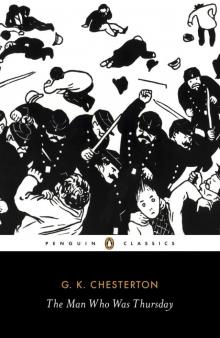 The Man Who Was Thursday: A Nightmare
The Man Who Was Thursday: A Nightmare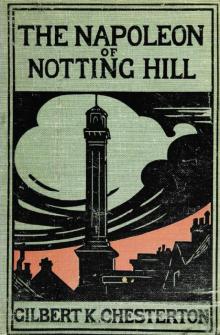 The Napoleon of Notting Hill
The Napoleon of Notting Hill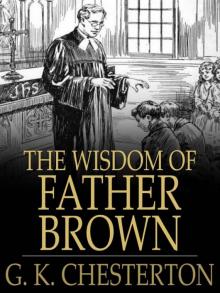 The Wisdom of Father Brown
The Wisdom of Father Brown G K Chesterton- The Dover Reader
G K Chesterton- The Dover Reader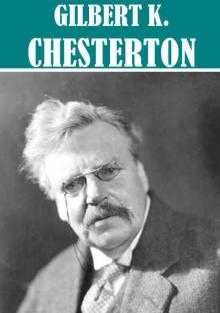 The Essential G. K. Chesterton
The Essential G. K. Chesterton The Trees of Pride
The Trees of Pride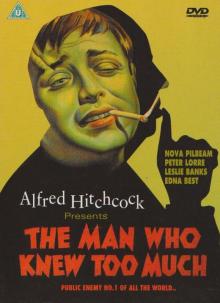 The Man Who Knew Too Much
The Man Who Knew Too Much The Ball and the Cross
The Ball and the Cross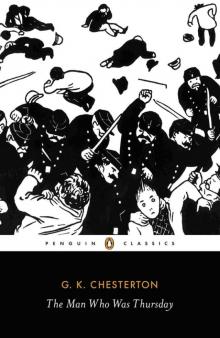 The Man Who Was Thursday (Penguin ed)
The Man Who Was Thursday (Penguin ed)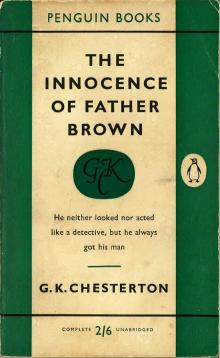 The Innocence of Father Brown
The Innocence of Father Brown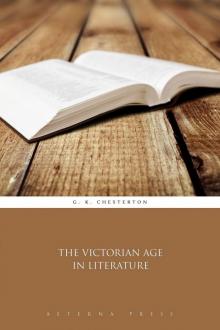 The Victorian Age in Literature
The Victorian Age in Literature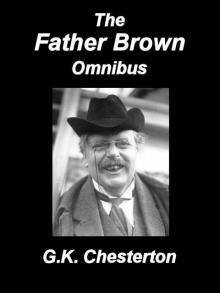 Father Brown Omnibus
Father Brown Omnibus Murder On Christmas Eve
Murder On Christmas Eve The Blue Cross
The Blue Cross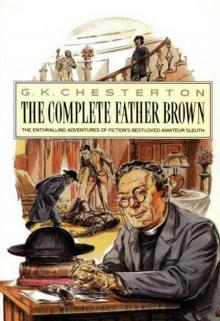 The Complete Father Brown Mysteries Collection
The Complete Father Brown Mysteries Collection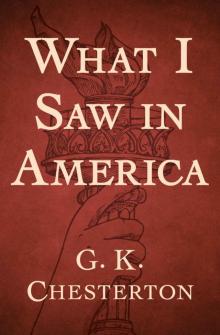 What I Saw in America
What I Saw in America